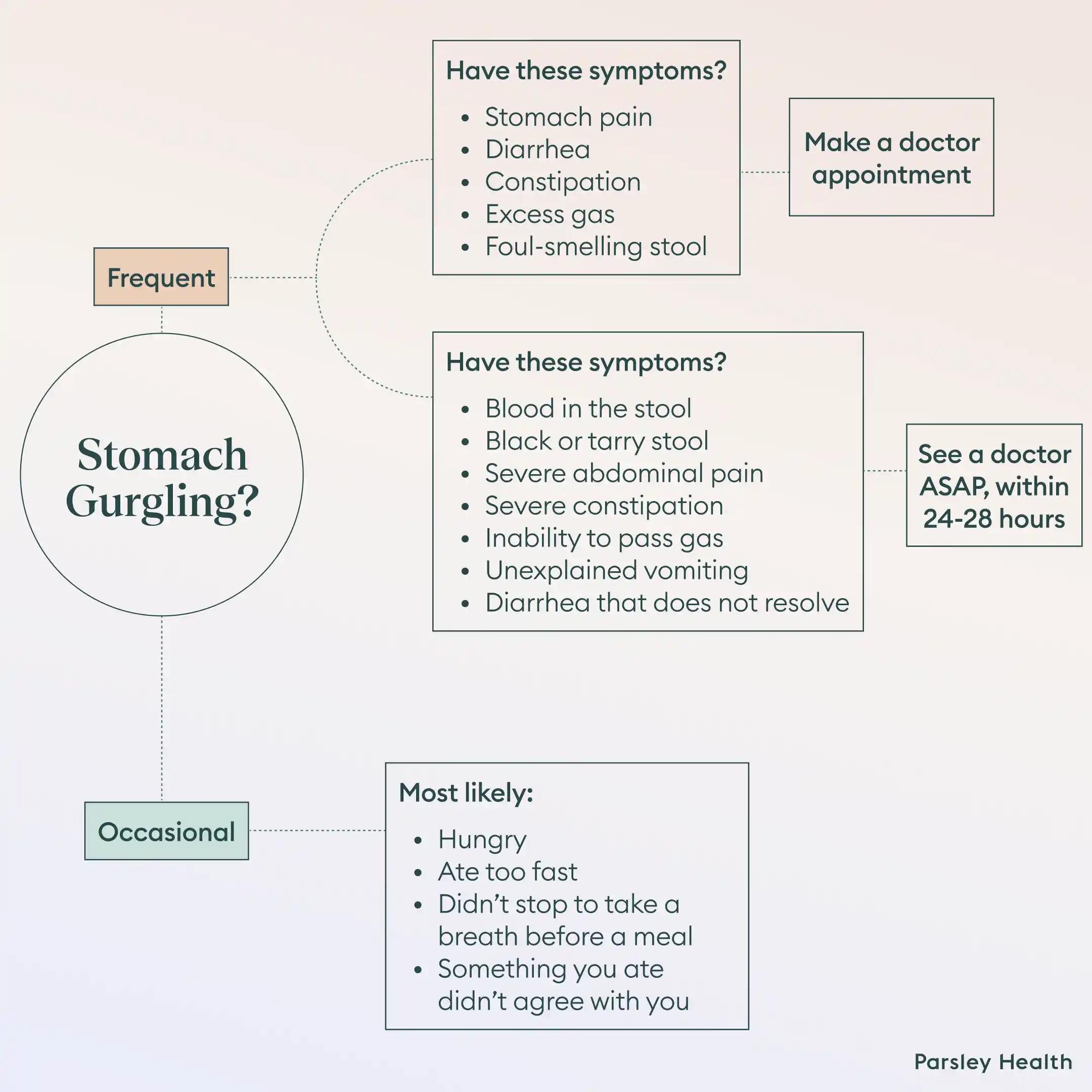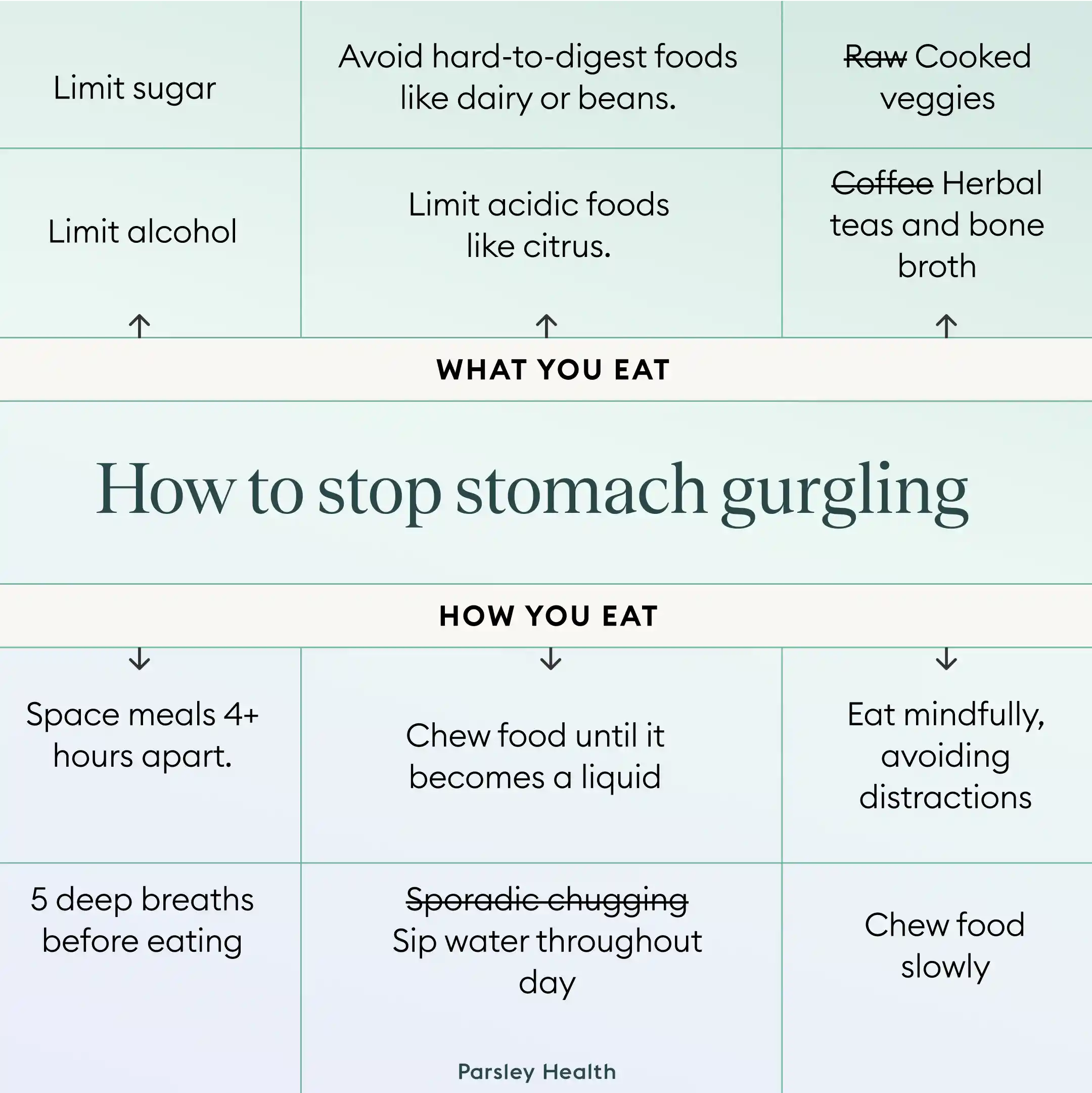This article has been medically reviewed by Nisha Chellam, MD. It contains additional reporting by Jennifer Chesak.
You've likely experienced stomach gurgling before. Abdominal noises are normal in response to a recent meal or if your stomach is empty and you're hungry.
If you experience bowel sounds infrequently, you can likely pinpoint what’s causing the occasional rumble. Possibilities include eating your food too fast, eating something that didn’t agree with you, or needing to eat.
But if loud stomach noises are a recurring issue or the sounds or sensations are vastly different than your usual gurgling, something else might be going on, like irritable bowel syndrome (IBS).
Likewise, the absence of bowel noises, or what's known as hypoactive bowel sounds, could signal an issue, such as a bowel obstruction.
If you’re constantly feeling abnormal bowel sounds or none at all, you may wish to see a doctor. Here’s how to determine your next steps.
When stomach gurgling signals another problem
Think about the last time you ate. If it’s been several hours and your only symptom is the gurgling (technically known as borborygmi), then it’s likely nothing serious, says Michelle Zook, MD, an internal medicine physician formerly with Parsley Health.

However, if you have any of the following unexplained symptoms that stick around or get worse, you should see your doctor.
- Stomach pain
- Diarrhea
- Constipation
- Excess gas
- Foul-smelling stool
You may be able to let symptoms like stomach growling and gas go on for a week or two to see if they go away.
But if you have more severe symptoms, such as the following, aim to see a doctor as soon as possible and definitely within 24 to 48 hours.
- Blood in the stool
- Black or tarry stool
- Severe abdominal pain
- Severe constipation
- Inability to pass gas
- Unexplained vomiting
- Diarrhea that does not resolve
How to get to the right diagnosis for stomach gurgling
When you go to your doctor with gastrointestinal symptoms like borborygmi, your physician will take a look at your health history. Zook says to prepare to answer a few questions about your symptoms.
- How long have your symptoms been present?
- Do you experience them regularly or just here and there?
- Does anything seem to trigger your loud bowel sounds?
- Do you notice your stomach gurgling at a certain time of day?
- Are you experiencing high-pitched bowel sounds?
- Have you experienced changes in your stool consistency, odor, or color?
- How often do you have bowel movements?
- Do you ever have blood in your stool or on your toilet paper?
- Is your stool black or tarry?
- Do you experience pain or cramping?
- Have you been exposed to anyone who’s been ill recently?
- Have you eaten any food that tasted bad, spoiled, or just not quite right?
- Have you traveled out of the country prior to your symptoms starting?
- Do you have pets or work with animals?
- Have you done anything that makes your symptoms worse or better?
After you tackle such questions, your doctor may want to listen to your bowel sounds, tuning into the amount of air or gas stored there, Zook says.
Your doctor may also press on different areas of the belly to assess tenderness, organ enlargement, or lumps or bumps.
For patients undergoing virtual visits, Zook says she might ask them to press on certain areas of their own belly while showing her through the video camera (if they're comfortable doing so) and reporting any areas that are tender.
Ordering basic labs might be warranted, she adds, to assess for a food intolerance, such as to lactose. Or your doctor might opt for stool tests or X-rays.
Specialized testing might investigate the following.
Gut dysbiosis is an imbalance of the microbes that make up the microbiome. Some common types include the following.
The conditions that cause stomach gurgling
Hunger is the most common cause of stomach gurgling, so learning to better read and respond to your own hunger cues can help if that’s the cause.
Another frequent cause is not reaching “rest and digest” mode (aka the parasympathetic state) prior to and while eating, Zook says. “Many of us are rushed and often multitasking through our meals.” This can lead to poor digestion.
Focus on taking a few deep breaths before you eat to activate your parasympathetic nervous system.
If these methods don't help, the sounds and sensations of borborygmi might come from a few other, more serious conditions, including the following.
- Infections, like bacteria, yeast, or parasites
- Small intestinal bacteria overgrowth (SIBO)
- Food intolerances, such as lactose intolerance
- Irritable bowel syndrome (IBS)
- Celiac disease
- Inflammatory bowel disease (IBD), including Crohn’s disease and ulcerative colitis
- Medication side effects
- Less common conditions, like tropical sprue (a malabsorption syndrome) and Whipple’s disease (a bacterial infection that affects the joints and digestive system)
- Congenital disorders, like Hirschsprung disease, an absence of nerve cells in a segment of the bowel
- A bowel obstruction, which may produce high-pitched bowel sounds
In any of these conditions, stomach gurgling occurs when three things happen in the body at the same time, Zook explains. These include a muscle contraction of the intestinal wall, presence of liquid in the intestines, and presence of gas in the intestines.
Depending on your health condition, you’ll experience different degrees of the contraction, gas, or liquid, which can then lead to variations in the volume and frequency of gurgling your gut produces.
How to stop stomach gurgling
Of course, your condition, if you have one, will determine the exact treatment for your stomach gurgling. “That’s why a thorough evaluation is so important,” Zook says.

For the more minor causes, like hunger, poor digestion, absorption, and food intolerances, Zook suggests starting with a small, healthy meal or snack to curb the sensation. You can also try the following.
- Avoid foods that might trigger borborygmi, like dairy or beans. Cooked veggies, including carrots, zucchini, green beans, and spinach, might be better options than raw veggies.
- Avoid coffee and sticking with herbal teas and bone broth to support healthy digestion.
- Sip water slowly throughout the day instead of chugging it here and there.
- Space meals at least four hours apart.
- Limit sugar, alcohol, and acidic foods like citrus.
- Reach that “rest and digest” state by taking four to five deep belly breaths right before your meal.
- Eat more mindfully by chewing your food slowly, avoiding distractions, and perhaps even playing relaxing music.
- Chew food until it becomes a liquid before swallowing. This stimulates the vagus nerve.
These tactics may be helpful for avoiding stomach gurgling and other digestive symptoms while you work with a doctor to uncover any root causes.
If you’re feeling off, a root-cause approach to your health can often help resolve persistent symptoms.
FAQ
What is stomach gurgling a symptom of?
Occasional stomach gurgling is most often a symptom signaling that you are hungry or that your gut is digesting a recent meal. However, in some cases, ongoing stomach gurgling could be a symptom of an underlying health issue, such as IBS.
Why is my stomach gurgling but I'm not hungry?
Although we normally associate a growling stomach with being hungry, we may experience bowel sounds if we've recently eaten and are digesting a meal. If you frequently experience unexplained bowel sounds, or discomfort, you should talk to your doctor about your symptoms.
How do you get rid of a gurgling stomach?
If you're hungry, eating may calm a rumbling stomach. However, if you've just eaten, your body may simply be digesting food. A few steps may help to quiet your gut.
- Stand up and move around or stretch to release trapped gas
- Sip some water to aid digestion
- Take a few deep breaths to relax your nervous system
What does a really loud gurgling stomach mean?
Occasionally you may experience loud stomach gurgling as a part of digestion. However, if loud bowel sounds are frequent or they persist, you may need to see a doctor to investigate your gut health further.
Ready to get to the bottom of your digestive symptoms? Schedule a free call to learn more about our root-cause approach and how we can personalize your health journey.








